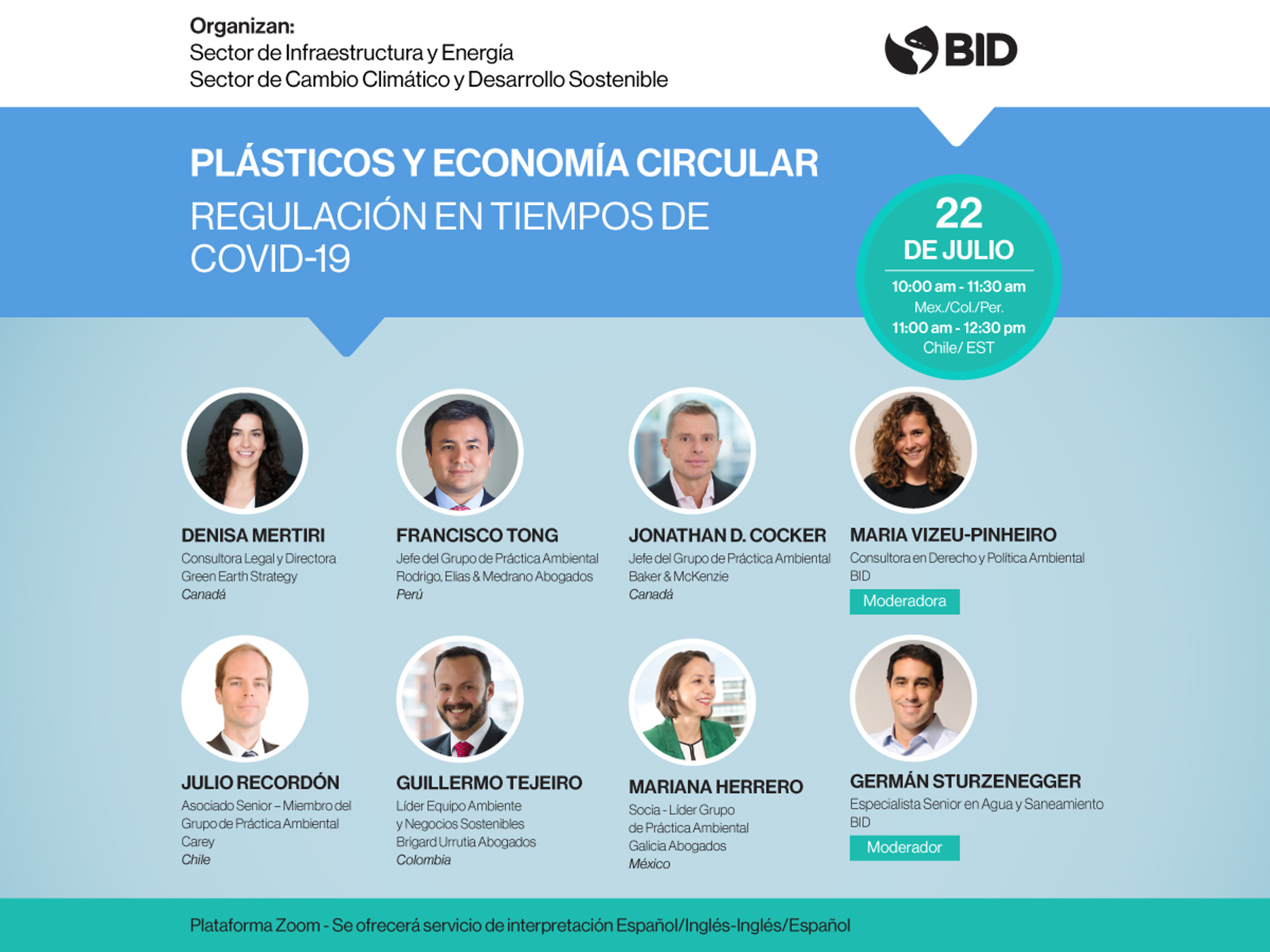The benefits of regulatory convergence within the Pacific Alliance can pave the way for a sustainable plastic management strategy.
By: Jonathan Cocker, Maria Vizeu Pinheiro, Denisa Mertiri and German Sturzenegger*
Plastic pollution, including through single-use plastics (SUPs), continues to plague natural environments around the world, including in Latin America and the Caribbean (LAC). The region produces around 28 million tons of plastic waste every year (12% of total municipal waste), of which around 36% is SUP. It is estimated that about 4 million tons of plastic waste could enter the ocean in 2020 due to inadequate solid waste management in coastal cities, where a significant portion of the population lives.
In LAC, there is growing interest in combating the shared problem of marine plastics. The countries of the Pacific Alliance (PA) -Chile, Colombia, Mexico and Peru- could lead the way. The bloc has launched an Environmental and Climate Change action plan, including a Presidential Declaration on Sustainable Use of Plastics[1] focused upon:
- An analysis of plastic bag regulation and recommendations for the reduction of their use;
- A targeted single-use plastic ban;
- Research and support for new productive models for plastic alternatives;
- Action on the reduction of plastic contamination in water, including marine environments;
- Strengthening the culture of responsible use of plastics and recycling;
- Circular economy model advancement;
- Promotion of re-use of plastic; and
- Setting a Road Map to implement these commitments.
In addition, individual PA countries, have each been active in promoting domestic strategies on plastic products and packaging, setting targets and developing regulations such as Extended Producer Responsibility (EPR), innovative recycling mechanisms such as “e-Coins”, and Circular Economy programs.
These initiatives, however, may not be enough considering the proliferation of plastic pollution and the limited domestic waste management infrastructure. This shared understanding within the PA must now give rise to a coordinated regional action on plastics for which greater regulatory convergence is pivotal.
Ten Reasons for Adoption of a Regional Plastics Strategy
While the work on regulatory convergence around plastics, including SUPs, is not an easy task, there are compelling reasons to do so:
- Facilitation of Materials Flows: the wide variety of plastics material has left local governments and industry to unnecessarily dispose materials as “scrap” domestically. These materials could be valorized in other PA countries if barriers to transfer were lifted, an issue particularly pressing in light of the Basel Convention Ban.
- Regional Scale Needed for Plastics Recycling Markets: addressing both the leakage of plastics and their value loss in less productive uses requires sufficient economies of scale that regional, and not domestic-only recycling infrastructure resources, could provide.
- Innovation and Specialization: with economies of scale will also come the conditions for investment in innovative products and resource recovery specialized solutions, potentially serving the entire region. These solutions will be imported into PA countries (based upon the regional needs and goals of others) if its members do not otherwise develop their own.
- Commercialization through EPR Favours Regional Consistency: as EPR may well be part of the solution for plastics resource recovery, the formation of effective Producer Responsibility Organizations (PROs) is enhanced through regional PRO models, servicing discrete industry segments and able to administer programs consistency, with lower transactions costs across multiple countries.
- Product Standards Development Suitable for PA: outside of the PA countries, there is current growth of plastics content standards (such as bioplastics) with corresponding resource recovery process requirements and specifications. These standards will be implemented in PA countries absent a regional alternative – even though these standards are based upon socio-economic and environmental conditions dissimilar to those of LAC.
- Material Bans Feasible Regionally: critical issues remain as to which types of plastics, for which uses and of what plastic material (and its potentially hazardous content) should be permitted by PA countries. Only through a regional strategy will the PA be able to ensure their domestic choices are implementable.
- Regional Market Data Will Attract Investment: the early adoption of regional terminology and methodologies will generate PA-wide data necessary to better attract investment.
- Ensuring Safety: food and other safety and quality measures must be imposed upon any plastics packaging or SUPs introduced within the PA. A regional strategy allows for commonly adoptable tracking and tracing technology, as well as labelling, to ensure the providence of the plastics introduced in the region’s markets.
- Near-term Financial Recovery Opportunity: plastics represent a resource for which there are clear near-term recovery solutions, such as energy production and valuable products made with recovered plastics, which will result in tangible economic gains for local communities across the PA; and
- International Stakeholder Funding Available: along with the push for plastics pollution solutions has come significant funding from international stakeholders, which will be acutely needed during the challenging post-COVID-19 economic fallout.
In summary, there are both immediate and long-term benefits to a PA-focused plastics strategy. Plastics offers PA countries a relatively easy entry point for the types of economic and environmental joint efforts envisioned in the region’s action plan.
The opportunities for plastics within the region are, however, time-limited. International pressure for conformity with policies most suitable elsewhere will intensify in the absence of demonstrable success.
Further, delays in moving towards convergence will make harmonization more difficult. With individual PA countries developing disparate programs, for which investments and long-term commitments will be based, a move to harmonize internally will be more difficult over time.
The PA countries should move to engage stakeholders, including regional private sector parties, in developing a critical pathway towards achieving these ambitious goals. For more details, these, and other topics, were discussed at a webinar on plastics and circular economy. You can access the recording here:
*Jonathan Cocker is Head of the Environmental Practice Group at Baker and McKenzie (Canada), Maria Vizeu Pinheiro is an IDB Environmental Policy Consultant, Denisa Mertiri is Director of Green Earth Strategies (Canada)
[1] This declaration was signed during the 2019 Pacific Alliance summit in Peru


Leave a Reply